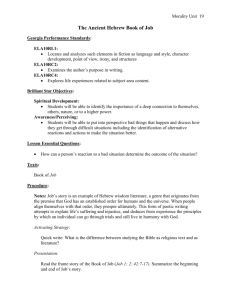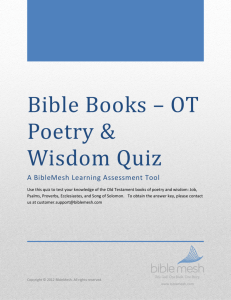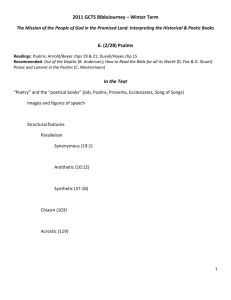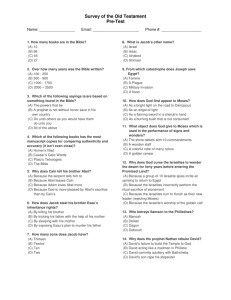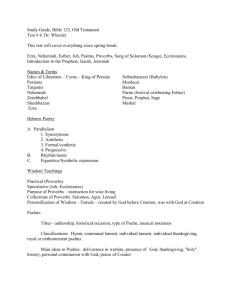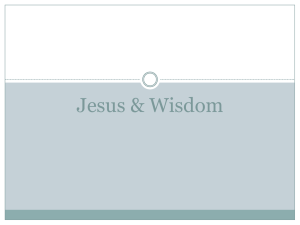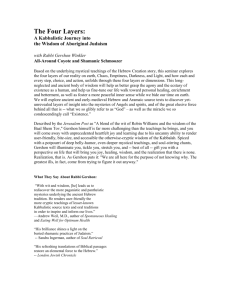Quizzes for Bullock Text - Western Reformed Seminary
advertisement
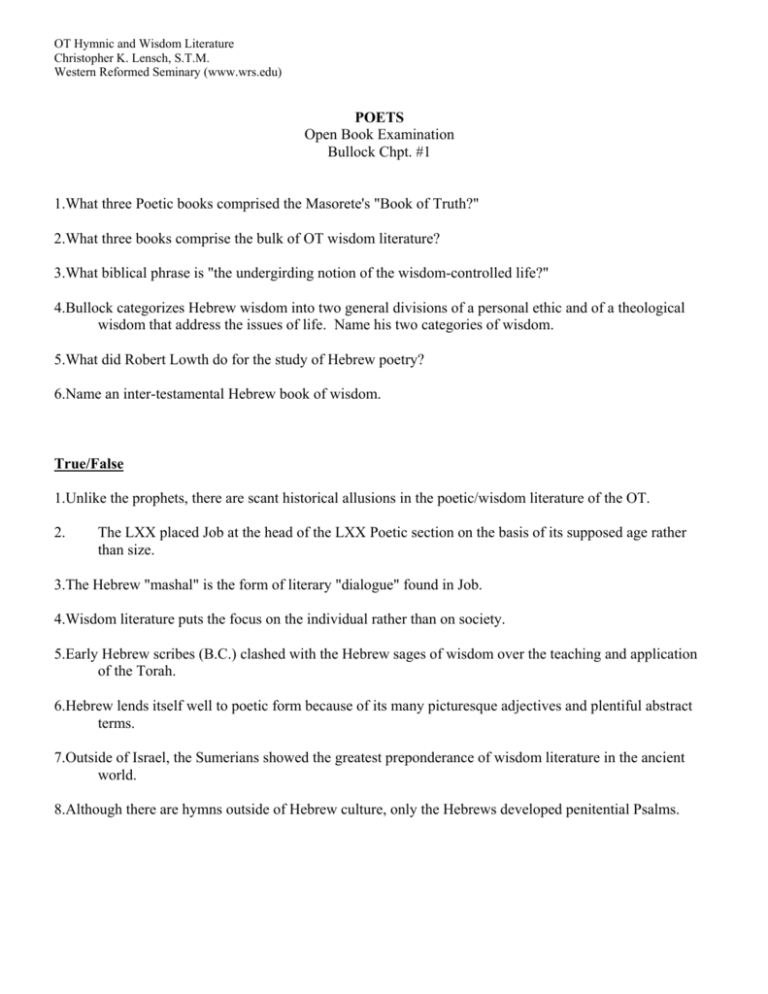
OT Hymnic and Wisdom Literature Christopher K. Lensch, S.T.M. Western Reformed Seminary (www.wrs.edu) POETS Open Book Examination Bullock Chpt. #1 1.What three Poetic books comprised the Masorete's "Book of Truth?" 2.What three books comprise the bulk of OT wisdom literature? 3.What biblical phrase is "the undergirding notion of the wisdom-controlled life?" 4.Bullock categorizes Hebrew wisdom into two general divisions of a personal ethic and of a theological wisdom that address the issues of life. Name his two categories of wisdom. 5.What did Robert Lowth do for the study of Hebrew poetry? 6.Name an inter-testamental Hebrew book of wisdom. True/False 1.Unlike the prophets, there are scant historical allusions in the poetic/wisdom literature of the OT. 2. The LXX placed Job at the head of the LXX Poetic section on the basis of its supposed age rather than size. 3.The Hebrew "mashal" is the form of literary "dialogue" found in Job. 4.Wisdom literature puts the focus on the individual rather than on society. 5.Early Hebrew scribes (B.C.) clashed with the Hebrew sages of wisdom over the teaching and application of the Torah. 6.Hebrew lends itself well to poetic form because of its many picturesque adjectives and plentiful abstract terms. 7.Outside of Israel, the Sumerians showed the greatest preponderance of wisdom literature in the ancient world. 8.Although there are hymns outside of Hebrew culture, only the Hebrews developed penitential Psalms. POETS Open Book Quiz Bullock Chpt. 2 SHORT ANSWER 1.Name a Psalm included in wisdom lit. that goes beyond natural revelation to speak of God's law. 2.Give two elements of Bullock's biblical humanism. 3.Match the following philosophies with their Greek system: Sophists / Stoics / Epicureans i. "Pleasure is the only good..." ii. "Man is the measure of all things, of things visible and invisible" iii. "Salvation is self-realization through self-discipline" 4.Again, what is the biblical phrase of wisdom lit. for faith in God? TRUE OR FALSE? 1.Wisdom lit. deals more with man's personal and interpersonal affairs than with nature or the physical world he lives in. 2.Natural revelation is more prominent in wisdom lit than direct revelation of the mind of God. 3.The method of wisdom is to address the smallest social unit and then to work outward in its universal applications instead of vice-versa. 4.Sheol in the OT always refers to the state of death, not the place of death. POETS Open Book Quiz on Job Bullock Chpt. 3 SHORT ANSWER 1.Name a comparative language that might help in setting Job's date. 2.Give a reason why early Jewish tradition held for a patriarchal date of Job. 3.Give a suggested location for the land of Uz. 4.Thematic unity of the book of Job argues against the late addition of which major section(s) to Job? 5.What was Elihu's explanation of God's involvement in Job's suffering? 6.In a sentence describe the relation of Satan to God in the Book of Job which avoids a dualistic theology where evil is on a par with the power of God's goodness. 7.Name the two OT books and chapters that clearly refer to the bodily resurrection. TRUE or FALSE? 1.Elihu apparently speaks to Job last in the debate due to his relative age. 2.The Book of Job probes the ageless question of theopneuma, the justice of God in the world. 3.Job's content easily could be patriarchal on the basis of the comparative antiquity of other middle eastern wisdom poems. 4.Despite the non-Hebrew setting of Job, the spirit and language of the book definitely are Hebraic. 5.Jeremiah's positive reference to Job is the one prophetic witness to the historicity of the character Job. 6.Eliphaz, as the oldest friend, is the most patient and gentle with Job, while Bildad is harsh and Zophar is sarcastic. 7."Rahab" in Job has the same root meaning as the harlot's name, viz., "lofty one." 8.Bullock believes that the Redeemer passage of Job 19 does not refer to Job's hope in his own bodily resurrection. 9.The interesting scheme of the book is for Job to progress from his focus on his own suffering to the universal problem of suffering, whereupon God in His answer to Job reverses the process to begin with a universal perspective and finally to address Job's personal complaint. 10.The DSS targum of Job, like the LXX of Job, somewhat changes the order of the material in the Book of Job. POETS Open Book Quiz Bullock Chapter 4 on PSALMS SHORT ANSWER 1.Bullock cites three indications from David's relation to music which demonstrate that there was an established hymnody from the time of David; name one. 2.Where did the Elohistic Psalter get its name? 3.In a word, what does each of the five Psalm divisions (books) end with? 4.Name two of the other three OT figures after David under whom the collection and preservation of the Psalter may have taken place. 5.What special aspect of the Psalms did James Thirtle research? 6.Name one of Bullock's five canons for interpreting a Psalm. 7.Do we get our tradition of seven penitential Psalms from the Jews or from the early church? 8.Can you give another general theological categorization to the Royal Psalms? Extra Credit (1/2 point each): i. Name a set of "duplicate" Psalms. ii. "Hodah," one of the Psalms' terms for praise, may be related to what physical posture, according to Bullock? iii. Who said, "Praise completes the enjoyment"? TRUE or FALSE? 1.The Greek/English title of the Psalms expresses more the form of the book, while the Hebrew title (Tehillim) emphasizes the book's content. 2.The chapter numbering in the LXX version of the Psalms is different from the MT due to some different divisions and some chapter fusions, yet the total number of Psalms of both Hebrew and Greek is the same. 3.The Elohistic Psalter, compiled by Eliho, is the next largest collection of single author Psalms after David and Asaph. 4.Jewish tradition says that the Psalter was organized into five sections on analogy with the Pentateuch. 5.There are titles on all of the Psalms of the Hebrew Bible except for the first two Psalms. 6.Because the monarch frequently is involved in the composition, community lament Psalms outnumber individual lament Psalms. 7.Gunkel's form critical disciple, Bulwinckel, tried to pull a rabbit out of the hat by insisting that certain "enthronement Psalms" taught that the king was reenthroned yearly at the Feast of Trumpets with the sound of blowing of a moose bugle. 8.In the DSS version of the Psalms, "Yaweh" is written in ancient Hebrew script while the rest of the text in Aramaic script. POETS Open Book Quiz Bullock Chpt. 5 on PROVERBS SHORT ANSWER 1.Name one of two discourses in Proverbs where the subject is feminine. 2.Bullock says that the function of Proverbs is philosophical. Can you name one of his three subfunctions? 3.According to Bullock, which is the active antagonist of many deadly sins: conscience, humor, or peer pressure? 4.Summarize the purpose of Proverbs. 5.The "men of Hezekiah" is a technical phrase for what particular office/vocation in the time of Hezekiah? 6.What historical events were going on in Palestine in Hezekiah's day that may have led him to gather the Proverbs of Solomon? 7.Does the LXX rearrange the beginning, middle, or end of Proverbs? True or False? 1.The early church fathers believed Solomon wrote all 31 chapters of the book of Proverbs. 2.The book of Proverbs generally employs the standard one line approach of the mashal rather than the popular distich proverb. POETS Open Book Quiz #6 Bullock on ECCLESIASTES SHORT ANSWER 1. Give one of the two explanations why Qoheleth ("the Preacher"), may be feminine in word form. 2. What is the recurring key phrase of Ecclesiastes, found especially in the prologue? 3. According to Bullock, one of the strongest arguments against Solomonic authorship is based on which one? a. an advanced theology b. linguistic analysis or c. Jewish canonical debates 4. Ecclesiasticus (ben Sirach) and the Wisdom of Solomon are two works of wisdom literature from the intertestamental period; which one emulates Ecclesiastes and which one denies the thesis of Ecclesiastes? 5. Two major competing schools of Pharisees before the time of Christ were led by Shammai (strict) and by Hillel (liberal in matters of life and Scripture). Name the one that rejected the canonicity of Ecclesiastes. 6. Complete the blank: "One of Qoheleth's trademarks was his assertion that W form the perfect pair to produce the greatest happiness in life. and Wealth Extra Credit: What does Bullock say ointments were highly prized for? TRUE or FALSE? 1. Although Solomon is cited by name in the Hebrew title of Ecclesiastes, Bullock opts for a postSolomonic composition, taking the mention of the name of Solomon as a gloss (later addition by a scribe). 2. As a rule, the Preacher gives his observations from the vantage of the first person ("I"). 3. Ecclesiastes was never meant to be didactic, but rather was the disillusioned expression of the Preacher, a frustrated Jewish philosopher. 4. Until the time of Delitzsch, Ecclesiastes was assumed by conservative scholars to have come from the pen of Solomon. 5. Although there is scant allusion to Eccl. in the NT, the Apostolic and early church fathers clearly quote this OT book. 6. DSS fragments of Eccl. from Qumran have been dated to around 150 b.c. POETS Open Book Quiz #7 Bullock on Song of Songs SHORT ANSWER 1. How is the typological interpretation of the Song different from the allegorical interpretation? 2. The mythical interp calls this a cultic song depicting the reappearing of which one of the following? a. Baal b. Tammuz c. Marduk d. Ishtar 3. Is the timing of the Song before marriage or during the honeymoon? 4. Name one of the other two women that Bullock suggests may have been from the Shulamite's home area. Extra Credit 1. What does an "epithalamium" have to do with this Book? 2. What did Sinaiticus and Alexandrinus add to the LXX version of the Song of Songs? 3. What is the meaning of the northern city of Tirzah? TRUE OR FALSE? 1. A Targum (Aramaic paraphrase) interpreted the Song as the history of Israel from the Exodus to the apocalyptic temple. 2. The adjuration "by the gazelles and hinds..." may be a play of assonance on "by the God of Hosts," thus giving a religious flavor to the Song.
